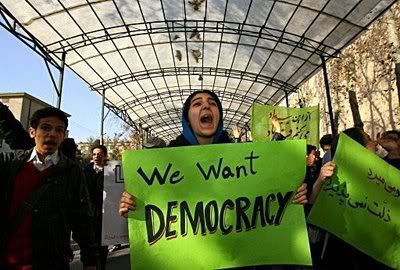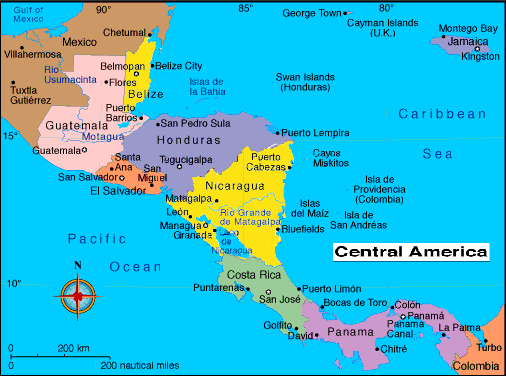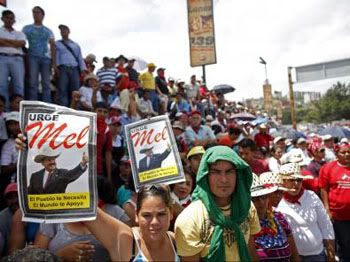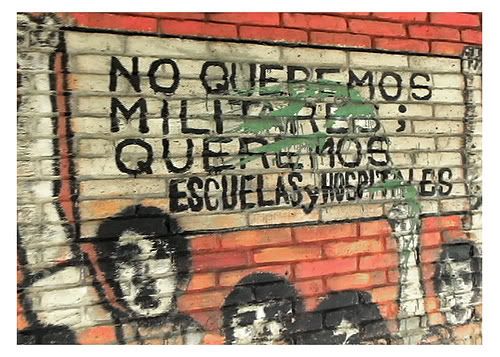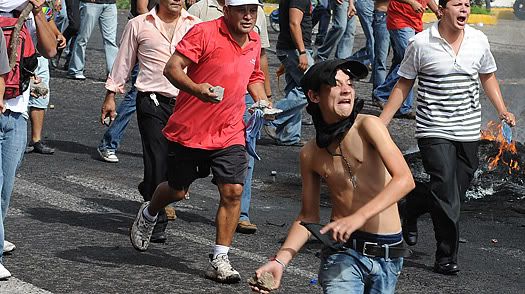Author's posts
Jul 17 2009
The Happiest Man In The World
And now, for something completely different. Really. I could relentlessly, clenching my teeth, continue to pound the keyboard to rant and fulminate about the latest outrages. We all do that. Or right now I could do something else, something that might even make me smile. Which brings me directly to Daniel Goleman’s lovely piece in today’s New York Times, “Sitting Quietly, Doing Something,” which is about “the happiest man in the world.”
Some anecdotes, though the entire article is well worth your time:
I recently spent an evening with Yongey Mingyur Rinpoche, the Tibetan lama who has been dubbed “the happiest man in the world.” True, that title has been bestowed upon at least a few extremely upbeat individuals in recent times. But it is no exaggeration to say that Rinpoche is a master of the art of well-being.
So how did he get that way? Apparently, the same way you get to Carnegie Hall. Practice.
When I called him at his Manhattan hotel… he told me he was in the middle of a shower – but not in the usual sense. The shower, he told me, had run out of hot water midway. When he called the front desk, he was told to wait several minutes and there would be more hot water. In this situation, I probably would have been peeved. But as Rinpoche told me this, he was laughing and laughing.
The only momentary glitch I’ve witnessed – a few years back – was slapstick: he sat down in an office chair with a faulty seat that suddenly plunged several inches with a thump. Once when this chair had done the same to me I cursed and groused about it for a while. But Rinpoche just frowned for a second – and the next moment he was his upbeat self again.
Another fruit of these spiritual practices seems to be a healthy dose of humility. When Rinpoche told my wife that he was being billed as “the happiest man in the world,” he laughed as though that were the funniest joke he’d ever heard.
So I’m wondering about this man. And his happiness. And my happiness. Wouldn’t being this happy be incredible fun? And wouldn’t I be so much more fun to be around if I were happier? And wouldn’t the happiness feelings drive whatever worry and anxiety I might be feeling right out of my mind? Wouldn’t everything in my life and surroundings look and feel and actually be different?
I’ve been a long time meditator, but unlike the great meditators whose minds are measured in laboratories, I’m sure I have nowhere near 10,000 hours of meditation. And I’d be lying if I said I was happy all of the time, or even the majority of the time. Sometimes I’m happy. Those times, sometimes, seem rare. Mostly, I think I’m in neutral. I have some equanimity. Sometimes, and I hope this is not the majority of time, like everyone, else I’m upset, afraid, depressed, anxious. I have negative feelings and emotions. Sometimes these occupy me for what seems like a long time.
So I wonder. What can I do to be more like Rinpoche? I want to be like Mike Rinpoche. Wouldn’t that make the world a better place?
————–
cross-posted from The Dream Antilles
Jul 14 2009
For Buhdy
Sometimes I forget what’s important. I forget that the world is made of love. I forget it. That’s human. I do it. My consciousness springs a leak and I forget. Ut oh. I do it frequently. And then, after a while, something happens to remind me, gently I hope, sometimes with ferocity, of what’s important, that the world is made of love. I then hold the realization like a glistening diamond for a second, or a minute, or an hour. I’m delighted, amazed, I’m filled with joy. And then, too soon, too soon, I lose it again, forget it, cannot remember where I put it. It’s gone. Where’d it go? I know I had it, I remember what it looked and felt like, but, alas, it’s gone. I know it’s gone. I admit it. I’m sad. I wish it were here. I’m afraid it won’t return. Despair is coming. And then, maybe, in the sound of the wind or the song of a bird or a dream, I hear it again, a hint, a reminder, an echo. There it is. It’s in me, it’s in all of us. We’re all made of it. It’s a world of love. Everything is made of it. We’re all connected, we’re all in everything else. And then, poof, it vanishes again. Where is it? Sometimes it stays gone for a long, long time. Sometimes not. And then, isn’t it wonderful? it returns. And when it returns, when the joy and ecstasy and unity and wonder and love and abundance and bliss return there’s only one thing to do.
Here is an example of the one thing to do:
There are, of course, other things to do also. There are as many things to do as there are people. There are 6 billion things to do. I like celebrations and ceremonies and drumming and dancing and chanting. Why? Because it’s the love we’re made of that’s most important and all of that expresses bhakti. And, yes, there are 6 billion other expressions of it.
May your world, and all of our worlds be filled with abundant love. And may we all celebrate it, each in our own chosen way, in bliss.
Jul 09 2009
Iran Protests Continue
| . |
The movement for democracy in Iran persists. The New York Times reports that demonstrations have again erupted in the streets of Tehran, and that to no one’s surprise, the Government has repressed them:
The Times says that the protest was initially “festive,” even though police in riot gear had shut down the streets. But then, as was threatened by the regime:
And so, phoenix like, the demonstrations for democracy in Iran continue. The press embargo continues (the Times article was datelined from Cairo). The Government was not reported to fire bullets at demonstrators. However, reports of detention of large numbers of demonstrators and also their lawyers continue, as do reports of torture and disappearance. It was not reported what opposition leaders say about the current demonstrations, but their web sites continue to contest the election. And it appears that there may be a split in the clerical backbone of the Government. The Twitter feed for #iranelection is still active, though the volume seems lower than last week. It continues to report the democracy movement. I am delighted by the news. I was afraid that the democracy movement had been snuffed out. That it was over. But I see now that was not the case. The movement hasn’t given up, and it is still asking us to stand in solidarity with it. cross-posted from The Dream Antilles
|
Jul 07 2009
Breaking in Honduras: Talks Instead Of Further Confrontation
Mediation between the golpistas and Manual Zelaya will take place in Costa Rica. The mediator will be Oscar Arias. Zelaya will not attempt to return to Honduras and will participate in talks.
The political standoff in Honduras between deposed President Manuel Zelaya and the regime that ousted him will be mediated by Costa Rican President Oscar Arias in an arrangement the U.S. helped to broker.
U.S. Secretary of State Hillary Clinton announced the mediator’s role for Arias today after meeting with Zelaya in Washington, where the exiled leader came to rally support for his return to office. Zelaya agreed to join the talks, to be held in Costa Rica, rather than try to go back to Honduras. The de facto government also agreed, she said.
“It is a better route for him to follow at this time than to attempt to return in the face of the implacable opposition of the de facto regime,” Clinton said. “Instead of another confrontation that might result in loss of life, let’s try the dialogue process and see where that leads.”
The negotiations may provide an avenue for both sides to back away from a confrontation that has triggered fatal clashes between Zelaya’s supporters and the military. As tensions mounted following the military’s overthrow of Zelaya on June 28, de facto President Roberto Micheletti pledged to arrest him if he returns. Meanwhile, Zelaya has won backing from the U.S., Europe and every nation in Latin America.
Will this work to bring democracy to Honduras? Will this restore Zelaya to the presidency?
Many questions. Few answers.
—————————–
cross-posted from The Dream Antilles
Jul 07 2009
Honduras: How To Help Those Who Flee
Yesterday I asked for your help. I was concerned because many poor people from Honduras have been fleeing the country, passing through Guatemala, and landing in shelters in Oaxaca and Chiapas, Mexico. These shelters are ill equipped to deal with a large influx of refugees. I wanted to help those who will help the refugees. I have now found two reliable organizations in Mexico that do just that.
Please join me below to help these refugees.
Jul 07 2009
Honduras: Please Help With This
Today I read that many poor people from Honduras have been fleeing the country, passing through Guatemala, and are landing in shelters in Oaxaca, Mexico:
The military coup in Honduras is providing an unexpected test of Mexico’s immigration and refugee policies. On Friday, July 3, dozens of Honduran nationals arrived at a church-run migrant shelter in the southern state of Oaxaca seeking refugee status because of the political situation in their country.
Alejandro Solaline Guerra, spokesman for the Mexican Episcopal Conference, said a group of Hondurans sought assistance at the House of Mercy in Ciudad Ixtepec on the Tehuantepec Peninsula. The migrant advocate said the bishops’ organization will contact the National Migration Institute to request refugee status for the Hondurans under international law.
“Migrants from a country in a state of war should not be denied refugee status,” Solaline declared.
The Honduran political crisis could aggravate an already conflictive situation in Mexico’s southern border region. Despite the international economic crisis, thousands of Central Americans and other Latin migrants continue to cross the country’s southern border en route to the United States. Along the way, migrants remain a favorite target of corrupt Mexican officials and bands of organized criminals.
I think that as the golpe de estado continues in Honduras and as the instability and repression grow, and the economy continues to be disrupted, more and more poor Hondurans will have to pick up and leave, fleeing across Guatemala and into Mexico.
I suspect that those who are running shelters all along the well traveled route from Honduras and across southern Mexico could help these refugees if they had money to do so.
That’s where I need help. El Hogar de Misericordia en Ixtapa does not have a web site. La Conferencia del Episcopado Mexicano has a site, but no way to donate. I don’t find on line anywhere to donate to support these refugees on their journey away from Honduras and into Mexico, though I am well aware that there are shelters along the route.
Long story short: I need your help to find a way to get funds to those who are helping the refugees from Honduras who arrive in Mexico.
This seems particularly important to me. Those fleeing Honduras are preyed on by gangs like the Mara Salvatrucha and their rivals, by coyotes, by the police. Their journey is precarious even when it is motivated purely by economics. And now, I fear the golpe de estado and the lockdown in Honduras and Honduras’s economic isolation will drive even more poor people from their homes into the snares set by waiting gangs and police. The shelters are essential to protect these refugees, to feed them, to give them an opportunity to stop in a safe place.
It would be a service to provide financial help to the shelters. The question, dear Dharmanics, is how we can do that. I ask your assistance in finding a way.
h/t to Mariachi Mama for the Mexidata article
Jul 05 2009
Honduras: The Oligarchy Strikes Back
A major confrontation approaches. Or does it? The New York Times breathlessly reports the drama in the air:
Honduras’ exiled president took off for home in a Venezuelan jet in a high-stakes attempt to return to power, even as the interim government told its military to turn away the plane.
Zelaya won wide international support after his ouster a week ago by the military, but the only prominent escort aboard his plane was the U.N. General Assembly president after Latin American leaders backed out, citing security concerns. Honduras’ civil aviation director said Zelaya’s plane was being redirected to El Salvador.
Several other planes carrying Latin American presidents, the secretary-general of the Organization of American States and journalists were leaving Washington separately, trailing Zelaya to see what happens in the skies over Honduras before deciding where to land.
Presumably, the Latin American presidents won’t land in Honduras if Zelaya’s plane is diverted to San Salvador.
And, of course, there’s a corresponding drama on the ground:
Thousands of protesters descended on the airport in the Honduran capital in anticipation of the showdown. Police helicopters hovered overhead. Commercial flights were canceled, and outside the airport about 200 soldiers with riot shields formed a line in front of the protesters.
”The government of President (Roberto) Micheletti has ordered the armed forces and the police not to allow the entrance of any plane bringing the former leader,” the foreign minister of the interim government, Enrique Ortez, told The Associated Press on Sunday.
So much for the golpista’s threat that Manual Zelaya, the deposed president, would be arrested if he set foot on Hondruan soil. Evidently, the golpistas have decided that they have a tight hold on the country, and they fear the consequences of attempting to arrest Zelaya on Honduran soil. Their tactic is simple: the golpistas control the air force and the airport. They will keep Zelaya from returning. The demonstrators will see nothing.
Nonetheless, thousands of demonstrators are making their way to the airport:
Zelaya has urged loyalists to support his arrival in Honduras in a peaceful show of force.
”We are going to show up at the Honduras International Airport in Tegucigalpa … and on Sunday we will be in Tegucigalpa,” Zelaya said Saturday in the taped statement carried on the Web sites of the Telesur and Cubadebate media outlets. ”Practice what I have always preached, which is nonviolence.”
Zelaya supporters said they got the message as they converged on the airport.
”We have no pistols or arms, just our principles,” organizer Rafael Alegria said. ”We have the legitimate right to fight for the defense of democracy and to restore President Zelaya.”
And so, we wait. And we watch. The odds, I think, are that Manual Zelaya’s plane will be turned away from Honduras, that the golpistas will continue to thumb their noses at the OAS, and that the question of appropriate sanctions, including the removal of ambassadors and the permanent cutting off of aid, will be the next topic of discussion.
The coup has to go. Democracy has to be restored in Honduras. I’m waiting to see exactly how committed the US and Canada are to those propositions.
————————————
cross-posted from The Dream Antilles
Jul 04 2009
Honduras: Fuera golpistas!
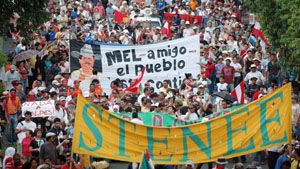
An estimated 20,000 protest the coup
Well, well, well. The 3-day waiting period is over. And guess what? Nothing’s changed, not really. The coup remains defiantly in power, the coup is withdrawing from OAS, Manual Zelaya is still in Costa Rica, his ministers are still in hiding in Honduras, the press is still embargoed. And demonstrations by both sides continue. For now, it’s apparently a standoff. Diplomacy seems not to have made a change; next is economic sanctions.
The demonstrations in support of democracy have grown. El Tiempo reports:
El verdadero pueblo está en las calles apoyando al presidente en el exilio, Manuel Zelaya Rosales, aseguraron ayer más de 20.000 manifestantes que protestaron por la restitución del mandatario.
La marcha, una de las más numerosas que los simpatizantes de Zelaya Rosales han efectuado desde el domingo pasado, día en que se perpetró el golpe de Estado en su contra, paralizó en un principio el Bulevar Juan Pablo II desde horas de la mañana….
Seguidores de Zelaya Rosales aseguraron que ellos son la voz del pueblo.
a multitudinaria manifestación en apoyo a Manuel Zelaya compitió paralelamente con la concentración de quienes están del lado del actual gobierno, sin embargo, ambas estuvieron muy parejas en cuanto a la cantidad de participantes.
There were, of course, large pro-golpista demonstrations as well.
The New York Times is glum:
Honduras’ refusal to restore ousted President Manuel Zelaya despite an appeal by the top envoy for the Americas has put the impoverished nation on a collision course with the world community that could lead to its isolation.
Honduras said it would no longer recognize the Organization of American States charter, claiming the diplomatic body attempted to impose ”unilateral and indignant resolutions” on the new government, which took power a week ago in a military-backed coup and forced Zelaya into exile.
OAS chief Jose Miguel Insulza had demanded Zelaya be restored to office, and on Saturday the organization was to discuss suspending the Central American nation’s membership. But Honduras’ interim president, Roberto Micheletti, said ”the OAS is a political organization, not a court, and it can’t judge us,” according to a note to Insulza read on Honduras’ television Friday night.
The move means Honduras, one of the poorest countries in the Americas, will leave the OAS and will not face sanctions by the organization, though it would not prevent other groups and countries from suspending aid and loans.
Nations around the world have promised to shun Micheletti. Neighboring countries have imposed trade blockades, the United States has halted joint military operations and European Union ambassadors have abandoned the Honduran capital. The World Bank already has suspended $200 million in financing, and the Inter-American Development Bank has put $450 million on hold.
Unfortunately, it’s unclear whether the golpistas care about any of this. It depends on whom the burden from the loss will fall. If the burden falls primarily and disproportionately on Honduras’s poor and not on the oligarchy, the sanctions will matter little to the coup. Only if the sanctions seriously impact the oligarchy, will they be an impetus to the restoration of democracy.
And the US? Will it withdraw its ambassador? Will it cut off all non-humanitarian aid? Apparently this is in the works.
The U.S. Embassy issued a statement Friday expressing ”deep concern over restrictions imposed on certain fundamental rights” by Micheletti’s government, including a curfew and ”reports of intimidation and censorship against certain individuals and media outlets.”
Military cooperation has already been suspended. And so was US Aid last week. Here’s the official description:
The State Department said Thursday it has put much of the U.S. aid program to Honduras on hold pending a legal determination as to whether the overthrow of elected President Manuel Zelaya last Sunday requires an aid cut-off. The United States meanwhile is cautioning Mr. Zelaya against an early attempt to return home.
The State Department’s legal team will probably determine that the overthrow of President Zelaya does fit the definition of a military coup, thus mandating a U.S. aid cut-off.
In the meantime, State Department Spokesman Ian Kelly said Thursday the Obama administration has effectively frozen those parts of the U.S. aid program – mainly military and non-humanitarian assistance – that would be covered by an aid cut-off.
Put simply, the money is on hold until a determination is made.
And in the meanwhile, it’s not at all clear what can be done to hasten the restoration of democracy in Honduras.
For my part, I support the restoration of democracy in Honduras, and I oppose the golpe de estado. I oppose the arguments made by coup apologists and from the oligarchy diaspora.
I say as loudly as I can, “Fuera golpistas!”
————————————–
cross-posted from The Dream Antilles
Jul 03 2009
Honduras: One Day Left
With one day left before OAS imposes sanctions on the coup, José Miguel Insulza, secretary general of the Organization of American States, is in Honduras today delivering the OAS’s message that Manual Zelaya must be reinstated as president. If he’s not reinstated, presumably by tomorrow, Honduras will be expelled from the OAS and various other sanctions may be imposed. The US is studying whether what happened in Honduras fits the legal definition of a “coup.” If it does, cutting off all aid to Honduras is statutorily required.
Jul 02 2009
Honduras: Diplomacy And A Harsh Curfew
With the 3-day period imposed by OAS for the restoration of democracy and the Presidency of Manual Zelaya in Honduras slowly ticking down, diplomacy is proceeding between OAS and Roberto Micheletti’s government. The military coup has imposed a harsh curfew, a feature of which is the withdrawal of various civil rights. Neither side has so far blinked. No progress in resolving the coup has been reported.
According to the New York Times OAS diplomacy to end the military coup in Honduras is proceeding. The United States role in this apparently is to give a cold shoulder to the coup, to cut off joint military operations, and to threaten a cessation of all aid if Zelaya is not restored to the presidency.
As the public standoff between Honduras and the rest of the world hardened, quiet negotiations got under way on Wednesday to lay the groundwork for a possible return of the nation’s ousted president, Manuel Zelaya.
After a marathon session that stretched close to dawn, the Organization of American States “vehemently” condemned the removal of Mr. Zelaya over the weekend and issued an ultimatum to Honduras’s new government: Unless Mr. Zelaya is returned to power within 72 hours, the nation will be suspended from the group.
Diplomats said they had rarely seen the hemisphere’s leaders unite so solidly behind a common cause.
The new Honduran government was equally resolute, warning that there was no chance Mr. Zelaya would be restored to office and that the nation would defend itself by force.
Both sides have stated their positions. Both appear inflexible. Has there been any movement? No. The OAS secretary general, José Miguel Insulza, went to Tegucigalpa today for further talks. Proposals being discussed involve an amnesty for the golpistas, Manual Zelaya saying he won’t seek an additional term, and restoration of Zelaya as President. Also, members of the Congress in Honduras are reportedly looking for a compromise. Details of those proposals aren’t available.
Meanwhile, according to the Times, the conflict in Honduras continues to be highly polarized:
Demonstrations for and against the new government continued in Tegucigalpa and other cities across the country [on Wednesday]. Then, in a move to crack down on the opposition, the nation’s Congress approved a decree on Wednesday that applies during the overnight curfew and allows security forces to arrest people at home and hold them for more than 24 hours.
“It’s for the tranquillity of the country,” said the new president, Roberto Micheletti.
The government has accused pro-Zelaya demonstrators of vandalism and violence, noting that a grenade, which did not explode, was hurled at the Supreme Court on Tuesday. Those who oppose the government, meanwhile, accuse the security forces of stifling dissent through brutality.
The withdrawal of civil rights is serious. It includes curtailing the right to assemble and to seek redress from the Government as well as the right not to be held without charge for more than 24 hours. These measures apparently permit the Government to detain the opposition if the arrests are made during the curfew:
According to Honduras’ El Tiempo, the following constitutional guarantees have been suspended:
* Article 69, which guarantees the personal freedom.
* Article 71, which states that no one can be detained or held incommunicado for more than 24 hours without an arrest warrant.
* Article 78, which guarantees freedom of association and freedom of assembly.
* Article 81, which states, “Everyone has the right to free movement, to leave, enter and remain in national territory.”El Tiempo reports that with the aforementioned guarantees suspended, “no one can hold meetings, neither public nor private, be it in the streets, in churches, in their own homes, or in union or guild halls.”
Meanwhile, Kristin Bricker reports:
he anti-coup movement’s momentum appears to be building across Honduras, with protests reported across the country. Meanwhile, international pressure builds against the coup government.
Over the past two days, anti-coup protests were reported in Tocoa, Colon; San Pedro Sula; La Ceiba; El Progreso, Yoro; Tegucigapla; Intibuca; El Paraiso; Olancho; Santa Barbara; and all over President Zelaya’s native department of Olancho. Moreover, the BBC reports that citizens have blocked major highways in Copan and Tocoa. The BBC’s sources on the ground in Honduras say anti-coup protests have occurred in the majority of Honduras’ departments.
And so, we sit and wait. I hope there will be a diplomatic resolution of the problem and a restoration of democracy in Honduras. In the meanwhile, there is very little any of us can do except to watch and to spread the news.
———–
cross-posted from The Dream Antilles
Jul 01 2009
Honduras: Three Days To Glare At The Opposition
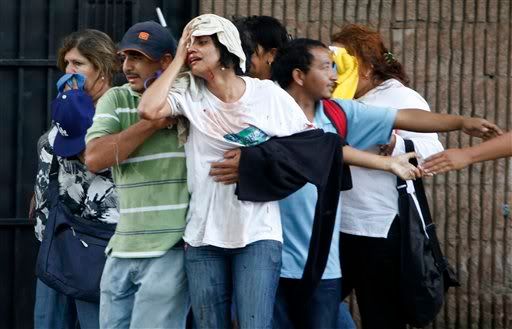
A Woman Injured Monday In An Anti-Coup Demonstration
The Thursday confrontation between deposed Honduran president Manual Zelaya and the Roberto Micheletti and his Honduran military coup has been delayed until Saturday.
CNN reports:
Ousted Honduran President Jose Manuel Zelaya said Wednesday he will not return to his home country until at least Saturday, after a three-day international deadline to reinstate him.
Zelaya had said earlier he would return to Honduras on Thursday. Provisional Honduran President Roberto Micheletti said Tuesday that Zelaya would be arrested on multiple charges if he returns.
The Organization of American States passed a resolution early Wednesday saying that Zelaya should be returned to power within 72 hours. The United Nations unanimously passed a similar resolution Tuesday afternoon.
The refusal to reinstate Zelaya, according to the OAS, will cause it to suspend Honduras’s OAS membership. Many OAS members have already withdrawn their ambassadors and cut off relations with the Micheletti coup government. The US has had nice words to support democracy, but has taken little if any action to restore Zelaya.
Unfortunately, and despite virtually universal condemnation, Micheletti continues to talk tough. In an interview with AP he continued his bravado and his defiance:
A defiant Roberto Micheletti said in an interview with The Associated Press late Tuesday that “no one can make me resign,” defying the United Nations, the OAS, the Obama administration and other leaders that have condemned the military coup that overthrew President Manuel Zelaya….snip
[The OAS’s three day] period for negotiation prompted Zelaya to announce he was putting off his plans to return home on Thursday until the weekend.
Micheletti vowed Zelaya would be arrested if he returns, even though the presidents of Argentina and Ecuador have signed on to accompany him along with the heads of the Organization of American States and the U.N. General Assembly.
Zelaya “has already committed crimes against the constitution and the law,” said Micheletti, a member of Zelaya’s Liberal Party who was named interim leader by Congress following the coup. “He can no longer return to the presidency of the republic unless a president from another Latin American country comes and imposes him using guns.”
Jul 01 2009
Honduras: A Face Off On Thursday
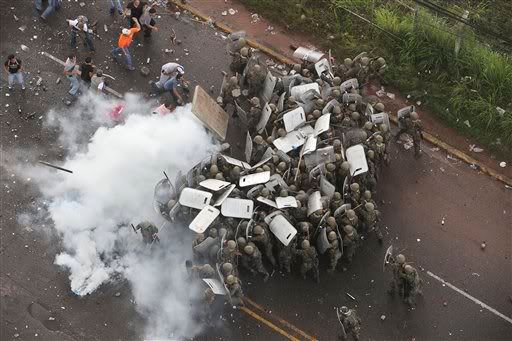
Honduran police clash with pro-democracy demonstrators
The military coup that deposed Honduran President Manual Zelaya has been denounced by almost everyone except the Honduran military. President Obama said about it, “We stand on the side of democracy, sovereignty and self-determination.” The OAS has condemned the coup. ALBA has condemned the coup. The UN General Assembly has condemned the coup. Central American nations have sealed their borders with Honduras. Most (except El Salvador) have also withdrawn their ambassadors. Roads are blocked in the country.
Police and soldiers clashed with pro-Zelaya protesters in the capital on Monday, and about 5,000 anti-Zelaya demonstrators gathered at a main plaza in Tegucigalpa on Tuesday to celebrate his ouster.
What is to happen next appears to be a confrontation, a face-off between the deposed President and the military coup that arrested and deported him.
Earlier today it was reported that President Zelaya will return to Honduras on Thursday:
Ousted Honduran President Manual Zelaya has announced that he will return to Honduras on Thursday. “I’m going to finish my four-year term, whether or not you coup leaders are in agreement,” he stated.
Zelaya will return to Honduras accompanied by the Secretary General of the Organization of American States (OAS), José Miguel Insulza, and a commission of Latin American presidents. The Argentine government has announced that its President Cristina Fernandez will accompany Zelaya to Honduras as part of the presidential commission. In a press conference following his speech to the United Nations General Assembly, Zelaya stated that Ecuadoran President Rafael Correa will also accompany him.
Colinas, Santa Barbara, Mayor Amable de Jesus Hernandez told TeleSUR that citizen caravans were being organized to travel from his region to the capital of Tegucigalpa on Thursday to receive President Zelaya.
Initially, earlier today, the return of the deposed president and other officials wasn’t supposed to be a direct confrontation with the military forces that arrested and forcibly deported him to Costa Rica:
Reports in Honduran and international press that interim President Roberto Micheletti says that “if Zelaya sets foot on Honduran soil he will be arrested” are overblown, thanks in large part to a provocative headline in that regard published by Colombia’s Radio Caracol. Yes, Micheletti has stated that Honduran courts have issued arrest warrants against Zelaya, but thus far he has not definitively stated that his forces will attempt to arrest Zelaya…
The [Radio Caracol] interviewer asked Micheletti how he planned to respond in the event that Zelaya … returned on Thursday. Micheletti responded: “My country’s courts have arrest warrants against him for breaking the law.” He then went on to explain his case for why Zelaya had broken the law when he attempted to carry out a public opinion poll on forming a new constitutional convention to draft a new constitution. Micheletti never told Radio Caracol that his government planned to act on the aforementioned arrest warrants.


